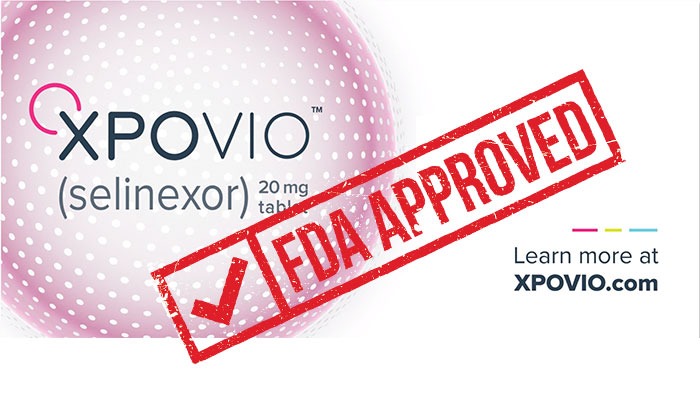The
Selinexor was approved under the accelerated approval program based on response rate. The FDA’s Accelerated Approval Program was developed to allow for expedited approval of drugs that treat serious conditions and that fill an unmet medical need. The full, continued approval for this indication may be contingent upon the ongoing phase 3 BOSTON confirmatory trial. The study will evaluate selinexor in combination with Velcade® (bortezomib) and low-dose dexamethasone.
The FDA’s accelerated approval was based on the multicenter, single-arm, open-label, STORM Phase 2b trial. “The 25.3% response rate seen in the subgroup of 83 patients in the pivotal Phase 2b STORM study that served as the basis for XPOVIO’s accelerated approval is clinically meaningful and a validated surrogate marker for clinical benefit in our patients with advanced refractory disease,” said Sundar Jagannath, MD, Director of the Multiple Myeloma Program, Professor of Medicine (Hematology and Medical Oncology) at
“Despite recent advances in the treatment of multiple myeloma, almost all our patients will develop disease that is resistant to the five most commonly used anti-myeloma drugs we currently have available, and the prognosis for this patient population is particularly poor. The accelerated approval of oral XPOVIO marks an important advance in the treatment paradigm for patients with relapsed refractory multiple myeloma, and in my view, is an important addition to our therapeutic armamentarium,” said Dr.
About the Phase 2b STORM Pivotal Trial
The accelerated
In STORM Part 2, a total of 122 patients were treated with selinexor (80 mg) in combination with dexamethasone (20 mg) on Days 1 and 3 of every week. Eighty-three patients had RRMM that was documented to be refractory to bortezomib, carfilzomib, lenalidomide, pomalidomide, and daratumumab. Treatment continued until disease progression, death, or unacceptable toxicity.
The major efficacy outcome measure was overall response rate (ORR), as assessed by an Independent Review Committee based on the
For the STORM Part 2 study’s major efficacy outcome measure, the ORR was 25.3% in the subgroup of 83 patients, which included one stringent complete response, no complete responses, four very good partial responses and 16 partial responses. The median time to first response for these patients was 4 weeks and the median duration of response was 3.8 months.
Amongst the 202 patients enrolled in STORM Parts 1 and 2 who were treated with selinexor (80 mg) in combination with dexamethasone (20 mg) on days 1 and 3 weekly, the most common adverse reactions (incidence ≥20%) were thrombocytopenia, fatigue, nausea, anemia, decreased appetite, decreased weight, diarrhea, vomiting, hyponatremia, neutropenia, leukopenia, constipation, dyspnea, and upper respiratory tract infections. The treatment discontinuation rate due to adverse reactions was 27%; 53% of patients had a reduction in the selinexor dose, and 65.3% had the dose of selinexor interrupted. The most frequent adverse reactions requiring permanent discontinuation in 4% or greater of patients who received XPOVIO included fatigue, nausea, and thrombocytopenia. The rate of fatal adverse reactions was 8.9%.
The full Prescribing Information for selinexor (XPOVIO) will be made available at www.XPOVIO.com.
